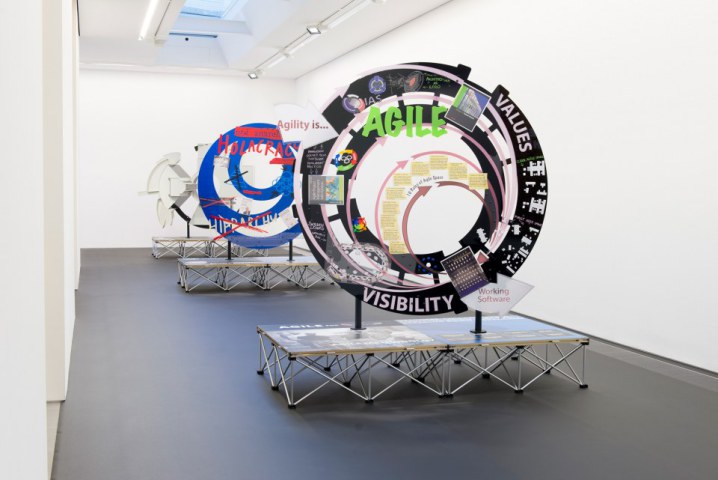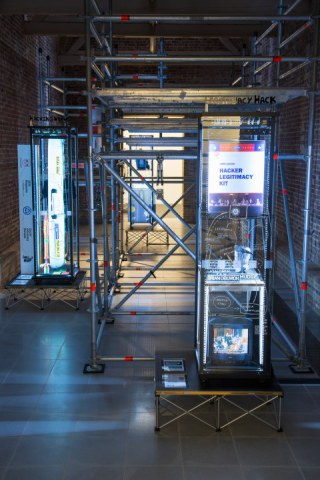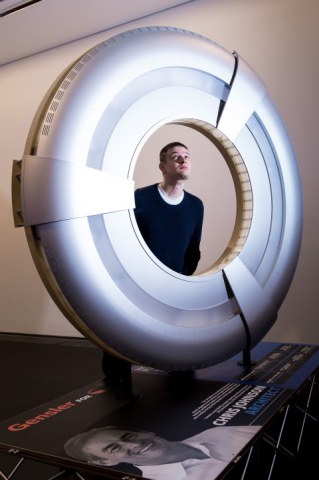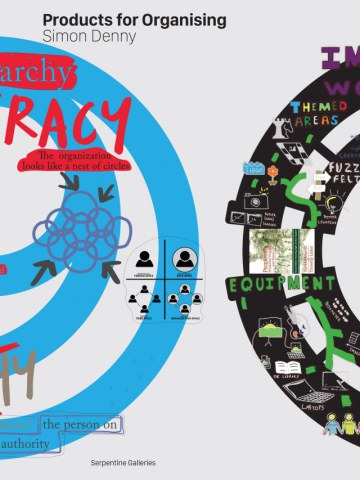



Arthub Favorite: Week Seven
Panel Discussion | Simon Denny: Products for Organizing
Watch Culturehacking online now!
Have you ever considered how technology shapes our lives on a daily basis? Are you a big brother conspirator? Can you rattle off the innumerable influences commercial tech companies have upon us? Do you feel the constant battle between surveillance and the right to privacy (no matter which country you reside within)? Are you aware of the benefits of hacking vs. the propagation of anti-hacking legislature?
If any of the questions above keep you up at night, or even if you’re just vaguely curious, Arthub encourages you to watch the panel discussion Culturehacking (recently uploaded to vimeo) with Simon Denny (artist), Heba Y. Amin (artist and researcher), Ryan Gallagher (journalist) and Brett Scott (journalist and campaigner). The event was moderated by writer and journalist Charlotte Higgins.
The panel discussed networks, power, revolution and surveillance for the occasion of Simon Denny’s solo show Products for Organizing at Serpentine Sackler Gallery in London. The exhibition ran from November 25 – February 14, 2016.
About Products for Organising
Serpentine presented the work of Simon Denny, an artist who works with sculptural installations that include print, graphics, moving images and texts. The first solo show of Denny’s work in London, Products for Organising, was developed in response to the Serpentine Sackler Gallery and featured new installations that revolved around contemporary radical management practices and the historical hacker organisational forms that may have inspired them.
Products for Organising featured entirely new works. The exhibition divided the Gallery into two sections labelled Products for Emergent Organisations and Products for Formalised Organisations. In the former, presented on the left side of the Gallery, a series of vitrines showcased within a scaffolding structure displayed information and materials mapping organisational logic used by today’s computer-hacker communities. The narrative that emerged through this installation presented a timeline of events selected from the history of hacking. This was illustrated through a combination of technological objects such as computers and everyday items including T-shirts and magazines.
In Products for Formalised Organisations, Denny created a new series of artworks that used, as case studies, commercial tech companies such as Zappos and Apple, alongside the Government Communications Headquarters (GCHQ) – the British intelligence and security organisation. These sculptures, inspired by the circular floor plans of the three organisations’ iconic headquarters, shed light on the similar managerial models used within these structures.
The exhibition made visible the ways in which different models can result in equally effective organisational strategies, scrutinising their impact on daily life.
For more details about this exhibition, please click here.
About Artist
Simon Denny (b. 1982 in Auckland, New Zealand) is an artist working with installation, sculpture and video.
He studied at the Elam School of Fine Arts at the University of Auckland, New Zealand and at the Städelschule, Frankfurt.
Selected solo exhibitions include MoMA PS1, New York (2015); Portikus, Frankfurt (2014); MuMOK, Vienna (2013); Kunstverein Munich, Munich (2013); and Aspen Art Museum, Aspen (2012). In 2012, Denny was awarded the Art Basel Statements Baloise Preis.
Selected group shows include Lyon Biennale 2015; After Babel,Moderna Museet, Stockholm (2015); Europe, Europe, Astrup Fearnley Museet, Oslo (2014); Art Post-Internet, Ullens Center for Contemporary Art, Beijing (2014); Speculations on Anonymous Materials, Fridericianum, Kassel (2013); Image into Sculpture, Centre Pompidou, Paris (2013); and Remote Control, ICA, London (2012). Denny represented New Zealand at the 56th Venice Biennale 2015 and was included in the central curated exhibition in 2013. He was included in the Lyon Biennale (2015), Montreal Biennale (2014), as well as the Sydney Biennale and the Brussels Biennale (both in 2008).
More about Simon Denny, please click here.